The Riot Will Be Televised
Video of the Feb. 25 riot in Dublin that was provoked by pro-loyalist Orangeman parade.
A journey is a hallucination. -- Flann O'Brien
Video of the Feb. 25 riot in Dublin that was provoked by pro-loyalist Orangeman parade.
They come every year as surely as Cromwell's army invaded Ireland, loud, boisterous, obnoxious foreigners, all. Tis the price of living in St. Louis' designated Irish-American neighborhood. Mind you, it's far from an exclusive ethnic ghetto. Growing up nearby, in a area that somehow has been annexed into the larger Dogtown community in recent years, there was a smattering of Greeks, Italians and Jews. The Burkes and Hogans and Cardinales and Kasinases all lived amongst each other. And in St. Louis, it's impossible to get away from the German immigant population. They would call it "diversity" today, although nary a black face was to be found in my elementary school. Segregation aside, second and third generation American families of European descent in St. Louis were more interested in assimilating back then, finding common bonds that united them. Now the trend is to single out what makes us different. But, of course, on St. Patrick's Day everybody is Irish. So they begin arriving from the hinterlands by the droves by mid-morning, the suburban hordes, who wouldn't live in Dogtown if they were paid to do so and have no idea where the island of Ireland is even located let alone what its history and people are all about. They clog the streets with traffic, get drunk, make noise and then, thankfully, leave. It's only one day not 600 years, but it's more than enough for any native to tolerate.
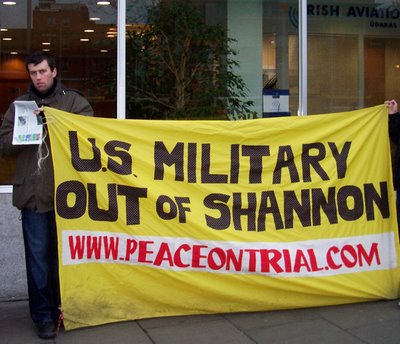
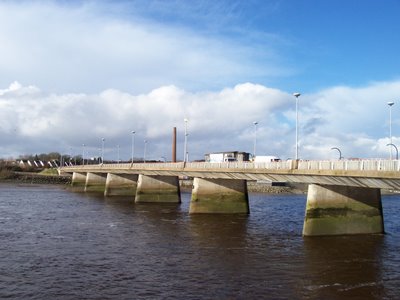



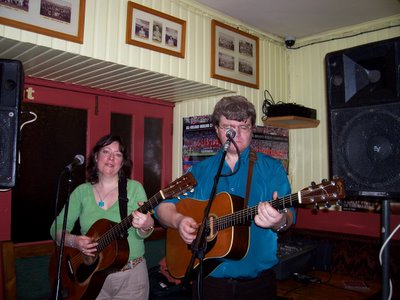
Irish Times, March 3:
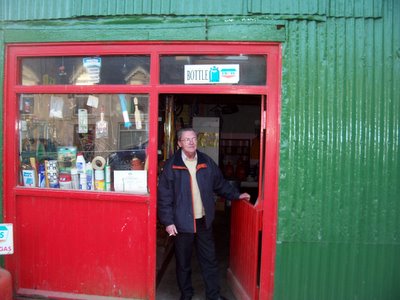
Security for US President George W Bush's brief stop at Shannon Airport in County Clare was estimated to have cost Irish taxpayers 300,000 euros by the Irish press, or 200,000 quid, in the North. If Bush wants to save American and Irish citizens a few bob, he should consider flying Aer Lingus the next time he pops across the pond. Irish anti-war activists used Bush's pit stop to again call for banning US military and intelligence flights from using Shannon as a refueling base in the so-called "War on Terror."

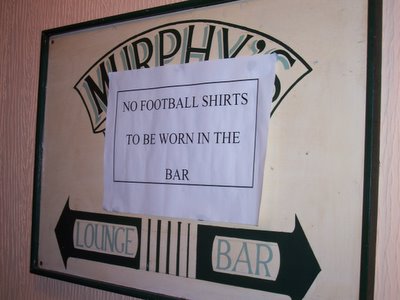





This press report was published before the brawl between republicans and unionists in Dublin earlier today.
"... The rioters' mayhem forced Protestant hard-liners to abandon their plan to parade through Dublin. It would have been the first parade in Dublin by pro-British Protestants since Ireland's partition into a mostly Protestant north and mostly Roman Catholic south in 1921. ..."

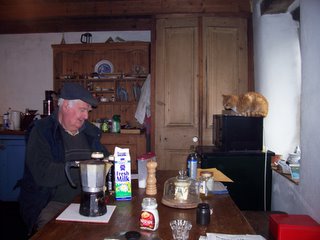
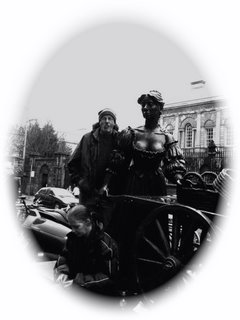
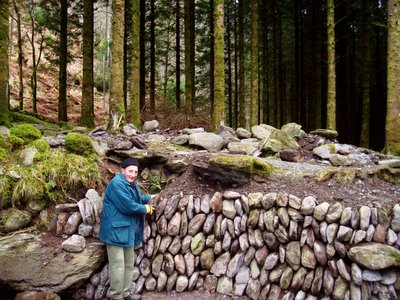
A kip is a hut. In Dublin it also denotes a bordello; a hovel or crash pad. "He lives in a kip south of the Lifey."
Among the Irish a foxer is the same as a moonlighting job, but the term is more inclined to define a job that is done strictly for cash to avoid taxation; the underground economy. "A foxer or two on the side never hurts a lad."

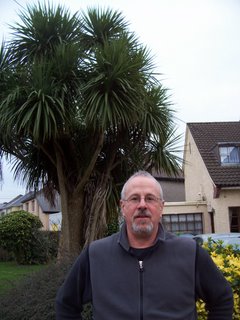
The word dear is used less as a term of (excuse the redundancy) endearment and more to denote an excessive expense. For example, the price of everything in Ireland, from petrol to fish and chips, is dear to a poor American.

A chancer is a risk taker. A scofflaw who jaywalks across a busy Dublin street is a chancer.
As a way of expressing doubt in someone's intelligence, the Irish might say, "He doesn't have the head of a spider."
The Irish are fond of political discourse, and they have incorporated some choice American words such as gerrymandering into the debate. They also have their own colorful way of describing political skullduggery. Two terms that I jotted down in my notebook early on in my visit that struck my fancy were the following:



Now that's I'm back in the land of the Conquistadors not to mention your average street thugs, I lament not buying myself a shillelagh, which is named after the town in mountainous County Wicklow south of Dublin, where the combination walking sticks and cudgels originated.

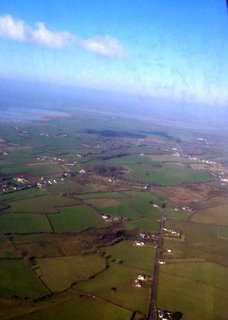


The hardest frost since I've been in Ireland descended on Ennis this morning. But still not hard enough to freeze the camelias in the garden of the hostel, where the sounds of water fowl honking (I assume they weren't Canada geese) could be heard on River Fergus. Goodbye, Ireland.
It's the reason that the Thames River is pronounced "Tims." There's no "th" sound in the Celtic tongue. "Tank" you very much to all my new friends in Ireland, long live the republic.
My host here in Ireland, for the first few weeks of my visit, was writer Robert Allen, a Belfast lad who hales from a Protestant background. It would be presumtious of me to try and explain briefly in a blog entry what it must have been like for him growing up in Ulster in the 1970s, and how he still grapples with rejecting his unionist background. For this is the stuff of books not blogs.
A shebeen was originally a thatched-roofed cottage with a small window from which drinks, most likely Irish moonshine called poteen, was sold. It now generally refers to a drinking establishment or pub.
Language in Ireland is of utmost importance. Control of language. In this respect place names are important. The second largest city in Northern Ireland is known by unionists and Brits as Londonderry, but for those who favor the republic the city is called just plain Derry.
Irish newspapers routinely feature promotions in which they give away CDs and DVDs. For instance, inside this morning's Sunday Times of Ireland is a copy of the film Danny Darko. I've also bought papers that have had CDs by the Dubliners, and compilation disk of Celtic love ballads given away on St. Valentine's Day.
There is a real estate office here in Ennis that caters strictly to Bulgarian properties. I've noticed one or two others in my travels around Ireland. Apparently, there's a big market for Eastern European properties here because of their low cost.
The first words I heard in Ireland came from the Aer Lingus attendant who advised me as a way of greeting to mind myself. I've managed to do just that for more than a month. But there's still one more day to go.
Roving packs of young people walked through the narrow streets of Ennis last night, where the pubs overflowed with people, music and drunk and disorderly conduct. By midnight, I bought some chips to take away, as they say over here, and beat a hasty retreat back to my room. Too old for this shite, lads.
The couple in the next room might not win a prize but they made an effort early in the evening before going out pubbing. On their return, I was woken from a shallow sleep and lay there waiting for the fun to begin. It didn't, thankfully, but I couldn't fall back asleep.
Say what you will about the wonders of Internet communications and Ipods, a good-old-fashioned transistor radio is also an asset while on the road, particularly when staying in rooms at hostels sans televisions. The radio gives you a bit of company when alone even if you're listening to a public affairs program broadcast in Gaelic. A pair of earphones also helps block the noise coming through the paper-thin walls.
Here in Ennis and elsewhere in what is now County Clare the O'Brien clan ruled as chieftans for ages starting 11th or 12th Centuries. There is a castle here built from the O'Briens. There is also a sandwich shop by the same name, a chain that is common throughout the island. The Irish version of St. Louis Bread Company or perhaps a cross with Bread Co. and Subway. Not a bad cup of joe.
Black stuff is the Irish slang term for stout beer, specifically Guinness, but also Murphy's and Beamish.
That's the tenative title to my soon-to-be bestseller. The first rule, after you remember to get behind the wheel on the opposite side (no small feat) is to always remember to look right. This rule is also a matter of life or death when crossing a street as a pedestrian.
Driving in rural Ireland is similar to the United States in that once beyond a certain invisible line drivers begin to acknowledge each other. Over here it's a casual wave of the index finger.
County Clare has to be the favorite haught of American tourists. Either that or I've been here so long that the winter-off season has changed to the tourist season. I've heard more American voices in the last two days then I did in the last month.
After driving around this country for five weeks, I finally figured out why Irish motorists tend to just flat out stop in the middle of the road. They do this for any number of unknown reasons. Often they'll just be out in the highway sorting things in thier boot. And when I say highway, I don't mean the kinds of highways that most Americans would consider such. These are narrow roads. The Galeic word for road is actually derived from "cow path."

Last night at a pub here in Ennis there was a table of Americans sitting behind me and their accents seemed foreign to my ear.
Short of sleeping with strangers in hostels, the Bed and Breakfasts are the most practical accomdations in Ireland. Each is unique, and the older ones still retain a sense of actually staying in someone's home. The B&B I stayed at in Ennis, for instance, was operated by a former boxer whose son, also a pugalist, had won the Championship for the All-Ireland award in the welterweight division six times. The trophies were all over the front hall and in the breakfast nook. The family also was involved in traditional Irish music. Thankfully, penny whistle practice knocked off early.

In the movie Michael Collins by Neil Jordan, the British enter an Irish football match and start firing randomly at players and fans. This actually happened during the war for independence here. After Ireland became a republic, the Gaelic Atheltic Association named its Irish football trophy for Sam Maguire, a footballer and also IRA member.
The conflict in Irish society in recent decades has been measured, particularly from abroad, as relating exclusively with the issues related to the continuing British occupation of the six northern counties in Ulster. But there is also a longstanding division between the east and the west of the country. This also has to do with Britain's centuries-long colonization of the island. Native Gaelic-speaking people tended to be centered in the west of the country, while Dublin and the eastern parts of the country, with few exceptions (noteably the 1798 rebellion in County Wexford), tended to be less resistant to British rule. This has caused an historical split, which also is related to the rural and urban differences and it is part of lexicon of the language.
The hostel that I stayed at for the last two nights is located in the mountains above the River Lee and is called Tir na Spideoga, land of robins. For more than a decade it has been operated by a German couple. Before that it was the farm of Tim McCarthy, who died according to local sources from drinking too much poteen, Irish moonshine.
Irish traffic signal, which are rare because of roundabouts (more on these later), turn yellow and then green. Once the yellow light appears it is acceptable to go through the light.
The waters of the River Lee start in the mountains and lakes in the West of Cork in the Gougane Barra National Park near the villages of Inchageelah and Ballingeary, which is known as a Gaeltacht, or Gaelic-speaking area. The river widenes into lakes here and is noted for pike fishing. The river runs 35 miles, emptying into the sea at Cork City.
There are 1,500 residences in Ireland that still have thatched roofs and more than a third of those can be found in County Wexford. An image of one will be added to this post later.
The latest way of flashing the peace sign in the U.S., by casually showing raising the back of your index and middle fingers, would be offensive here in Ireland. Two fingers here are the same as one in America. For instance, the front page of the Irish examiner yesterday showed an acquitted gangster flipping two fingers at the Garda, which is the Irish name for police.

St. Patrick's Cathedral, on the south side of the Liffey River in Dublin, is the resting place of noted Irish satirist Jonathan Swift. If he were able to comment from his crypt, I'm sure he would have something caustic to say about the Church of Ireland charging five euros to view his tomb.

Crisps are potato chips.
The old man next to me at the Crane bar on the Sea Road, seemed to be indicating in no uncertain terms that I had somehow invaded his space. He was staring past me, and brushing my elbow every time he went his to quaff a bit of his pint of Guinness. Even though I wasn't getting it at the moment, the message he was sending became perfectly clear after my friend Robert Allen explained the situation later. Robert, who had been sitting on my other side, was occupying William's seat. William, said Robert, had been sitting at the corner bar stool he was seated on for the better part of the last 30 years. Robert had taken the seat just to wind the old man up. Cheers, William.
The old woman I encountered on Quay Street in Galway could have been Biddy Ward, the widow of traveller Galway John, but for the fact that Biddy, a local character died years ago. She was begging for alms, mumbling her story in such a deep brough that I could only make out that she was trying to 'get home.' I gave the woman a few coins.
Strip clubs are few here and controversial, but off-track betting parlors are ubiquitious. Ditto casinos and card clubs, which operate out of storefronts.
Off License is a now-archaic term that you will often see posted on the front of pubs. Before the liquor laws were changed recently, pubs had to be granted special dispensation to sell drinks beyond the normal closing hours, which were early by American standards.
Travellers are Irish gypsies. Traditionally, they were itinerent workers, usually tinkers. The term now denotes con artists.
The word brilliant is used as Americans might say fantastic or great or beautiful.
TV weather forecasters don't talk about cloudy skies in Ireland. Instead, they refer to gray days as dull.
The angelus, a prayer to the Virgin Mary, is broadcast by RTE television each night at 6 p.m. The minute-long slot shows people of all walks of life pausing to silently pray as church bells chime in the background.
Everything is narrow here, the streets, the roads, the aisles of grocery stores the feckin' toilet stalls.
Snugs are booths with door on them found in traditional Irish pubs. There aren't too many of them left. One of the finest examples of snugs is found inside Belfast's Crown pub, across from the Europa Hotel, which was frequently bombed during the sectarian strife of recent decades. After years of such blasts,the owner of the pub had a template made of the stain glass windows in the front of the pub so that they could be replaced each time the hotel was bombed across the street. The pub has now been preserved by the British National Trust.
Many homes in Ireland are still heated with peat, either the natural type or compressed briquettes. In addition, coal is often used in fireplaces and stoves. The coal is imported from Poland and costs approximately 11 euros for a 20 kilos.
The ground hog may have seen his shadow in the U.S., forecasting another six weeks of winter, but here in Ireland flowers are blooming, including crocuses and daffodils.
A "biscuit" is a cookie in Ireland. It is served often with coffee or tea. Packaged cookies at the supermarket are labeled biscuits.
"Yer man" is a phrase that is routinely tacked onto a sentence regardless who the speaker is talking about. For instance: "Yer man drove the lory to Dublin."
The fast-food franchise that advertises 100 percent Irish beef in its burgers is called SuperMac.
A solicitor is a lawyer.
A Sinner (pronouned SHINN-er)is a member of the Sinn Fein, the political party that has traditionally advocated the unificiation of British-occupied Northern Ireland with the 26 southern counties that make up the Republic of Ireland. Sinners are not necessarily directly linked to any factions of the Irish Republican Army (IRA), but they often hold similar political views. Of course, the degree of affiliation between the political party and the para-military organization is itself a matter of dispute. The conservative Irish Independent, newspaper, which is referred to as the Indo here in Ireland, ties the Sinners and the IRA directly together in its style sheet.